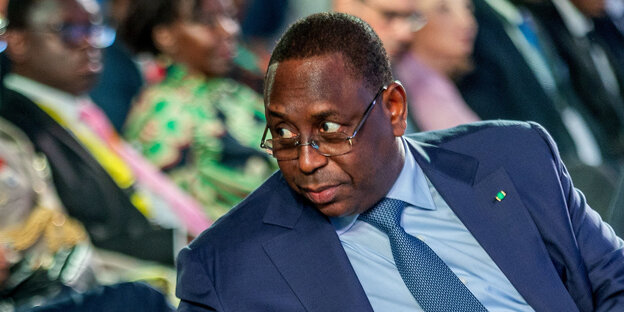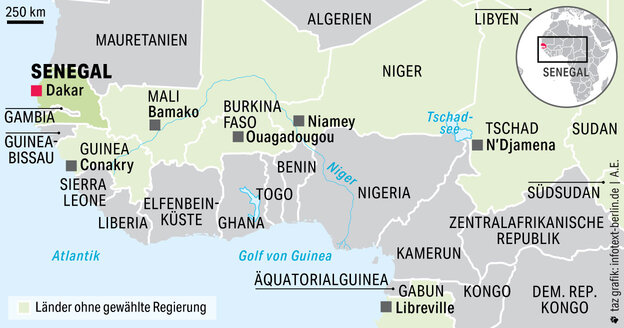Senegal has always considered itself more enlightened. President Macky Sall once embodied respect for institutions and the constitution. Not anymore.

Macky Sall 2023 in Kigali Photo: Jean Bizimana/Reuters
taz | Senegal is considered a kind of beacon for Africa. It is a country of poets and thinkers: the first president, Léopold Sédar Senghor, won the Nobel Prize for Literature, and the best-known intellectual, Cheikh Anta Diop, created his work deriving African culture from ancient Egypt and calling for an “African Renaissance.” , an important basis for Pan-Africanism and postcolonial African self-confidence.
Senegal was the starting point of European maritime trade relations with sub-Saharan Africa from the 15th century and the starting point of France's colonial conquest of the Sahel region of West Africa in the late 19th century. To this day, Senegal can boast of being the only West African country that has never experienced a military coup. And until a few days ago it was the only country in the region where an election date had never been postponed.
It is this historical significance that leaves many people in Senegal stunned today. President Macky Sall not only postponed the elections for a few months. As many observers see it, he carelessly trampled on his country's rules and thereby put an end to Senegal's political culture.
Tuesday night's images of police in riot gear storming the meeting room shortly before the crucial parliamentary vote and dispersing protesting MPs represent a breach of the dam. “The Republic is threatened, anything is possible,” warns the respected commentator Vieux Savane in the independent newspaper Everyday South. “It is urgent to return to reason and restore constitutional order as soon as possible before Senegal collapses.”
Ancient hope for the young
Macky Sall, of all people. When he became president in 2012, he embodied respect for the Constitution. His predecessor, Abdoulaye Wade, sought an unconstitutional third term and even got it approved by the Constitutional Court. Thanks to a mobilization of young protest groups and election observers, opposition leader Sall was able to beat Wade in the second round of elections and put an end to the nightmare. However, he did not advance in the renewal of an increasingly economically and socially polarized country.
Instead, his game with institutions became increasingly risky: first he changed the constitution so that his second term would last seven years instead of five. He then left it open for a long time whether he would run again in 2024 and, at the same time, eliminated by legal means all promising opposition candidates. Then he didn't show up. And now he postpones the election.

A similar situation led to a popular uprising in Burkina Faso in 2014, which began with an angry protest movement that occupied parliament and ended with the army taking power to applause from the crowd. Just over two years after the change in Senegal, an “African Spring” seemed to be emerging. Democracy activists from Burkina Faso and Senegal worked closely together and provided advice and support to imitators in other African countries.
But that era has passed. In Burkina Faso, the new president, first elected in 2015, was overthrown in a military coup in 2022, followed by a second coup, and the country is now deeply mired in a civil war against Islamist terrorist groups. Military coups also wiped out the relatively young civil democracies of the Sahel region in 2020 in Mali, in 2021 in Guinea, and in 2023 in Niger. In Chad and Mauritania, presidents from the army are in power. Once again, power comes from gun barrels throughout the Sahel, except in Senegal.
Too important to fail
In the eyes of Europeans, Senegal is the last rock of democracy in a sea of instability. For years, people turned a blind eye to Sall's increasingly erratic course. Because while the military governments of Guinea, Mali, Burkina Faso and Niger are all anti-Western and pro-Russian, there is no doubt about Senegal's “Western ties.” Regionally, Senegal is simply too important to abandon. UN aid organizations active in the region operate from Dakar, 350 French soldiers are permanently stationed there and the Bundeswehr's withdrawal from Mali last year was carried out through Senegal. Senegalese generals have led UN peacekeeping missions on several occasions and Senegal is one of the world's largest suppliers of UN police officers. Germany has even classified Senegal as a “safe country of origin” in terms of asylum policy since 1993, something that not even France does.
But if pro-Western Senegal now becomes as autocratic as its anti-Western neighbors, in the end only Senegal's anti-Western opposition, which has long been yearning for a coup d'état similar to Mali or Burkina Faso, will score points. Now all the alarms are ringing in Western capitals.